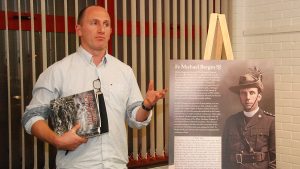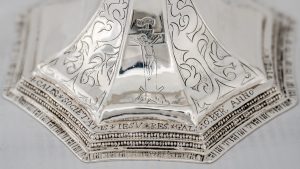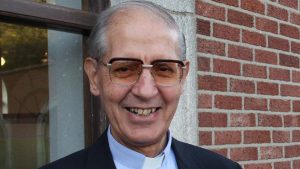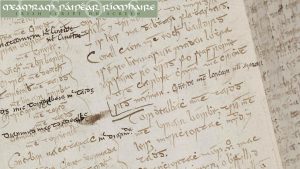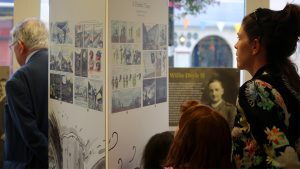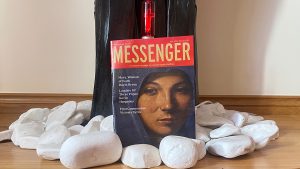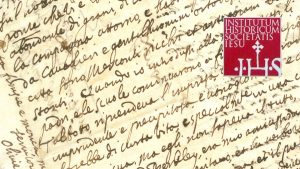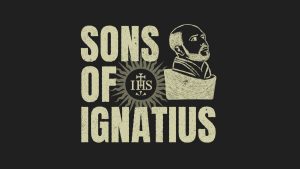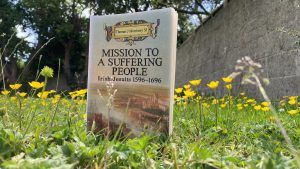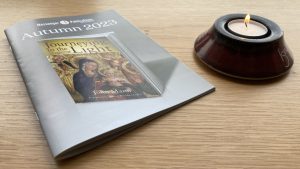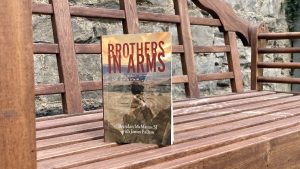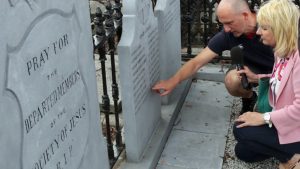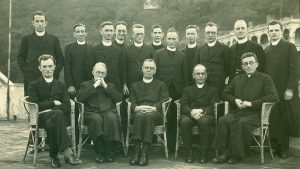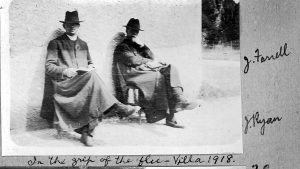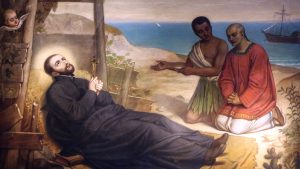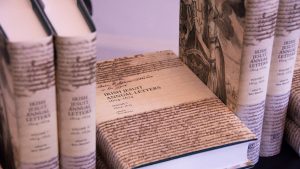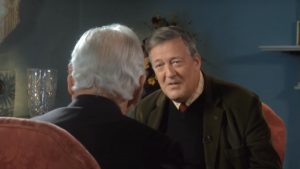Irish Jesuits and the London IRA, 1921
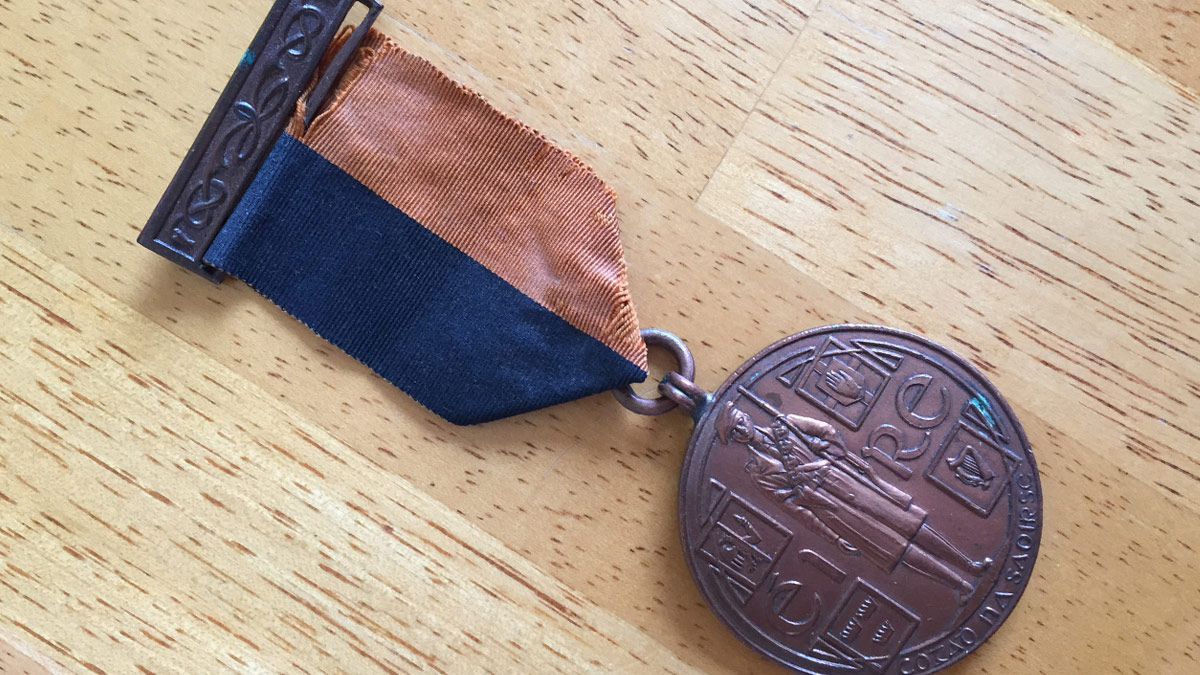
Damien Burke :: In late 2020, a medal was handed into the Jesuit community at Milltown Park, Dublin. Black and tan in colour, the Service (1917-1921) Medal was issued to those on active service in the War for Irish Independence. With the help of online material provided by the Military Archives, Cathal Brugha Barracks, Dublin, namely the Military Service Pensions Collection (1916-1923), Medals Series, it was established that the medal belonged to Fr William McElligott SJ (1901-1952). Checking the IRA nominal rolls for the London Battalion, William (Liam) McElligott and John (Sean) Banfield (1900-1939), both had the SJ suffix after their names. McElligott and Banfield both entered the Society, after membership of the Irish Republican Army in the War of Independence period, 1919-1921: McElligott joined the Irish Province of the Society of Jesus, while Banfield, joined the British Province.
Born in Crayford Kent, England, William’s mother died at childbirth and he was sent to be educated in Belgium. His obituary in The Mungret Annual noted that “In later years he used often recall his bewilderment when he awoke on his first morning there, a lonely little boy, surrounded by French speakers who buttoned their shirts up the back”.
Returning to England before the First World War, he finished his education at the Xaverian Brothers’ orphanage school in Sussex – it seems his father had also died. McElligott entered the British Civil Service in 1917, and joined the Irish volunteers in London in 1919. He was attested under oath for the Irish Republican Army, by Sam Maguire. The IRA in London was involved in the disruption of services, such as the burning of infrastructure. In 1920, McElligott was involved in an attack at Price’s Candle Factories, and in January 1921, he was arrested following an attempted attack on the Anglo-American Oil Storage, and other industrial concerns around Wandsworth, South London. Remanded for trial at Brixton prison, along with Seamus Moran and Thomas O’Sullivan, on counts of conspiracy to commit arson and possession of firearms, a lack of positive identification of McElligott by the police, meant that charges of participation in the attacks were unable to proceed. Instead, he was fined, and bound over in securities provided by Art O’Briain. On release from prison, McElligott reported to his old company. Moran and O’Sullivan were sentenced to eight years imprisonment at Dartmoor Prison, and were released after the Anglo-Irish Treaty of 1921. After the ratification of the Treaty, McElligott was transferred to Ireland under the newly created Irish Civil Service, and worked with the Land Commission until 1927. He wished to enter the Society of Jesus, aged 27. He was, however, requested to learn Latin in preparation for his noviceship. In 1928, he studied for a year at Mungret College, Limerick, before entering at St Stanislaus College, Tullabeg, County Offaly, where his flair for languages amazed his fellow-novices. He could now speak and write Latin – and he had also acquired Kerry Irish!
Ordained in 1940, as McElligott was about to undertake tertianship (the final element of Jesuit formation) at Rathfarnham Castle, Dublin, he applied for a Service (1917-1921) Medal, in order ‘to satisfy a sentiment to possess some tangible reminder of what were very moving days’. To establish McElligott credentials, names of his fellow IRA members were required. McElligott’s commanding officers from his London experience, Reginald Dunn and Joseph O’Sulllivan, were both executed in August 1922, after the shooting of General Sir Henry Wilson. Therefore, Seamus Moran, Art O’Briain and Thomas O’Sulllivan verified that Father Liam McElligott served with the Irish Volunteers and Irish Republican Army in London, 1919-1921. McElligott did not apply for a military pension, or wish for any publicity regarding his medal request.
McElligott spent the greater part of his Jesuit life at Mungret College, Limerick, where he taught French. His interest in the methods of teaching modern languages meant that he acquired Hungarian, Polish and Russian. In the period after the Second World War, a number of refugee boys were educated at Mungret College. The pupils section of The Mungret Annual, 1946, states: ‘We are glad to have amongst us Andre Sozanski. We did not know that Father McElligott could speak Polish’. Fr William McElligott SJ was remembered among those ‘Men who made Mungret’. The reappearance of the medal is a testament to that.
See the Military Archives website section on Military Service Pensions Collection »: Also see The IRA in Britain, 1919-1923, In the heart of enemy lines by Gerard Noonan (Liverpool University Press, 2014).


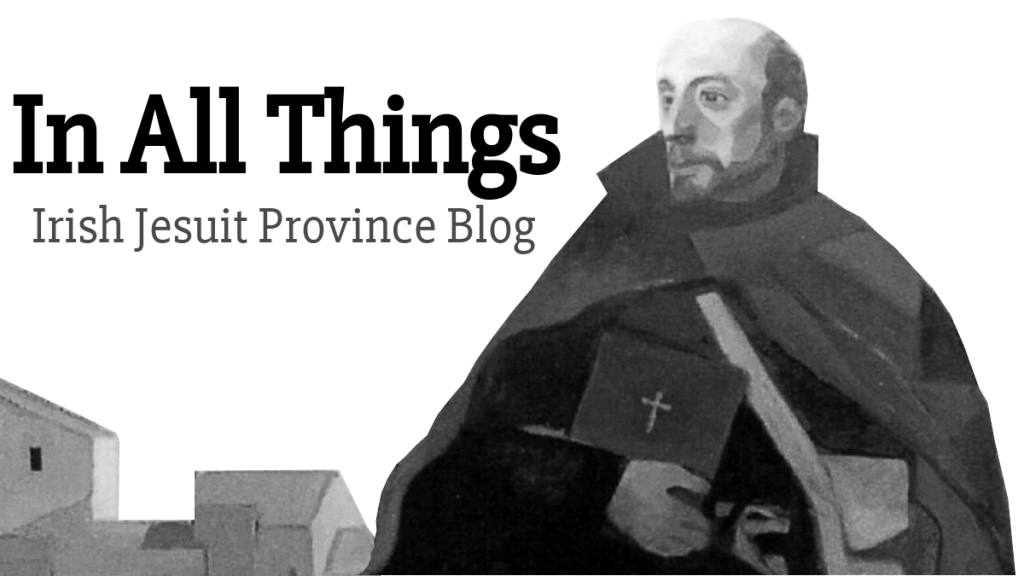
 Damien Burke is the Archivist of the Irish Jesuit Province. Originally from Cork, he now lives in Dublin with his wife and young family.
Damien Burke is the Archivist of the Irish Jesuit Province. Originally from Cork, he now lives in Dublin with his wife and young family.